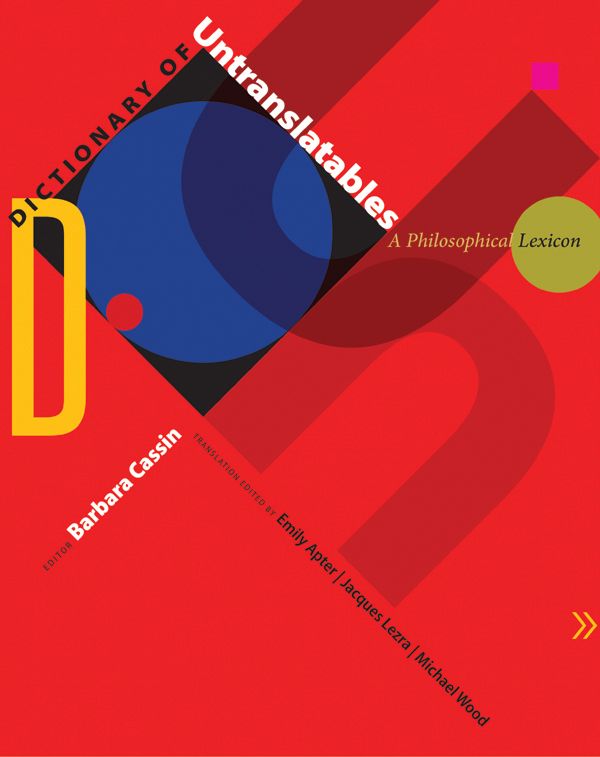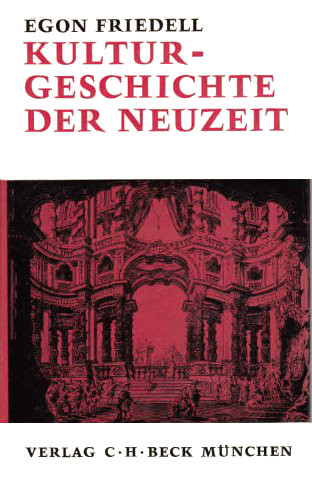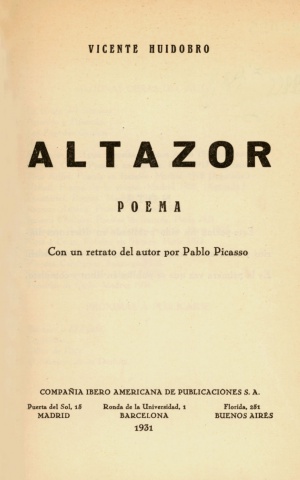Barbara Cassin (ed.): Dictionary of Untranslatables: A Philosophical Lexicon (2004–) [FR, EN]
Filed under book | Tags: · aesthetics, history of philosophy, humanities, knowledge, language, linguistics, literary theory, literature, logic, philosophy, political theory, translation

“This is an encyclopedic dictionary of close to 400 important philosophical, literary, and political terms and concepts that defy easy–or any–translation from one language and culture to another. Drawn from more than a dozen languages, terms such as Dasein (German), pravda (Russian), saudade (Portuguese), and stato (Italian) are thoroughly examined in all their cross-linguistic and cross-cultural complexities. Spanning the classical, medieval, early modern, modern, and contemporary periods, these are terms that influence thinking across the humanities. The entries, written by more than 150 distinguished scholars, describe the origins and meanings of each term, the history and context of its usage, its translations into other languages, and its use in notable texts. The dictionary also includes essays on the special characteristics of particular languages–English, French, German, Greek, Italian, Portuguese, Russian, and Spanish.
Originally published in French, this one-of-a-kind reference work is now available in English for the first time, with new contributions from Judith Butler, Daniel Heller-Roazen, Ben Kafka, Kevin McLaughlin, Kenneth Reinhard, Stella Sandford, Gayatri Chakravorty Spivak, Jane Tylus, Anthony Vidler, Susan Wolfson, Robert J. C. Young, and many more.The result is an invaluable reference for students, scholars, and general readers interested in the multilingual lives of some of our most influential words and ideas.”
The book has been or is in the process of being translated into Arabic, Chinese, Farsi, Portuguese (5 Vols, scheduled 2009-11), Romanian (scheduled 2013), Russian, Spanish, and Ukrainian (3 Vols, 2009-13, (2), (3)).
First published in French as Vocabulaire européen des philosophies: Dictionnaire des intraduisibles, Seuil/Le Robert, Paris, 2004.
English edition
Translated by Steven Rendall, Christian Hubert, Jeffrey Mehlman, Nathanael Stein, and Michael Syrotinski
Translation edited by Emily Apter, Jacques Lezra and Michael Wood
Publisher Princeton University Press, 2014
Translation/Transnation series
ISBN 0691138702, 9780691138701
1344 pages
Untranslatables and their Translations (Barbara Cassin, Transeuropéennes, 2009, in French, English, Arabic and Turkish)
Commentary (Jacques Lezra, video, 12 min, 2014, in English)
Wikipedia (FR)
Project website (archived)
Publisher (FR)
Publisher (EN)
Vocabulaire européen des philosophies – Échantillon IMAGE (French, HTML version of 30 entries related to the notion of image)
Dictionary of Untranslatables (English, EPUB, PDF)
Egon Friedell: A Cultural History of the Modern Age (1927–) [DE, EN]
Filed under book | Tags: · aesthetics, art history, cultural history, history, modernity, politics, religion

Austrian essayist, cabaret performer, and amateur cultural historian Egon Friedell is best known for his brilliant, playful, and stimulating magnum opus, A Cultural History of the Modern Age (1927-31), written under the influence of Oswald Spengler and Jacob Burckhardt. He hoped for a rebirth of Western culture; the Modern Age, which was born from the Great Plague of the fourteenth century, has come to its end. At the eve of World War II, Friedell committed suicide by jumping from a window of his apartment. The German writer Thomas Mann ranked Friedell as one of the greatest stylists of the German language.
A Cultural History of the Modern Age, inspired by H.G. Well’s The Outline of History (1920), is dedicated to Max Reinhardt. Its first volume deals with Renaissance and Reformation, the second Baroque, Enlightenment and the French Revolution, and the third part Romanticism, Liberalism, Imperialism, and Impressionism. Friedell’s view is subjective and intuitive – all history is saga and myth and it is nothing more than a difference in degree between historian and poet. “All the classifications man has ever devised are arbitrary, artificial, and false,” Friedell wrote, “but simple reflection also shows that such classifications are useful, indispensable, and above all unavoidable since they accord with an innate aspect of our thinking.” Following the Hegelian lines of though, Friedell sees his subject basically as a the process of spiritual history. Oswald Spengler’s (The Decline of the West, 1918-1922) pessimism and atheism he rejects. From the English writer, historian, and critic Thomas Carlyle (1795-1881) Friedell adopted the romantic “great man” theory of history, the hero-worship, totally ignoring its ominous connection with the political reality of his day. Every era and every generation has according to Friedell its own hero, a genius, who personifies the Zeitgeist, the spirit of the age. Nietzsche was for Friedell the epitome of the pre-WW I era. (from Petri Liukkonen’s short biography of Friedell)
German edition
Publisher Beck, Munich, 1927, 1928, 1931
This edition, Zweitausendeins, Frankfurt am Main, 2009, 1335 pages
English edition
Translated by Charles Francis Atkinson
With an Introductory Essay by Alfred Polgar
Publisher Alfred A. Knopf, 1930, 1931, 1932
Fifth printing, 1953 (Vol 1); Third printing, 1954 (Vol 2); First printing, 1932 (Vol 3)
353 + 457 + 489 pages
via hz40lat46
Review (of Vol 1, Crane Brinton, Speculum, 1953)
Review (of Vols 1-2, International Journal of Ethics, 1932)
Review (of Vol 2, Eli Siegel, Scribner’s Magazine, 1931)
Review (of Vol 3, Robert Briffault, Scribner’s Magazine, 1932)
Review (of Vol 1, C. Hartley Grattan, The Forum, 1930)
Review (of Vol 1, David Owen, The Saturday Review, 1930)
Review (of Vol 2, The Saturday Review, 1932)
Review (of Vol 3, Alfred M. Frankfurter, The Bookman, 1932)
Wikipedia (DE)
Kulturgeschichte der Neuzeit; Kulturgeschichte Ägyptens (German, 1927-31/2009, at Archive.org)
A Cultural History of the Modern Age, Volume I, Volume II, Volume III (English, trans. Charles Francis Atkinson, 1930-32, no OCR)
Vicente Huidobro: Altazor, or, A Voyage in a Parachute/1919, a Poem in VII Cantos (1931–) [ES, EN]
Filed under fiction | Tags: · poetry

“The first modern poet of the Spanish language — in many ways its Apollinaire — Vicente Huidobro is generally considered to be one of the four greatest Spanish American poets of [the last] century. Yet unlike his peers — César Vallejo, Pablo Neruda, and Octavio Paz — Huidobro is still little-known in the English-speaking world.
Altazor, a book-length poem first published in 1931, is Huidobro’s masterpiece and one of the wildest poems of any language. The century’s great paean to flight, the poem sends its hero (Altazor, the antipoet) hurtling through Einsteinian space at light-speed, as all places and times collapse into one.” (from the back cover)
Publisher Compañia Ibero Americana de Publicaciones, Madrid/Barcelona/Buenos Aires, 1931
111 pages
Bilingual Spanish/English edition
Translated by Eliot Weinberger
Publisher Graywolf Press, Saint Paul, Minnesota, 1988
A Palabra Sur Book
ISBN 1555971067
167 pages
via filboid
Commentary: MemoriaChilena (ES), Justin Read (Translation Review, 2006, pp 61-65, EN), Mario Nandayapa (Liminar, 2006, ES), Bruce Dean Willis (Hispanic Issues, 2010, EN), Comparative analysis with Beckett’s Imagination Dead Imagine (Margaret Lees McTague, Master’s Thesis, 1976, EN).
PDF, PDF, HTML (Spanish, 1931, updated on 2020-12-6)
PDF (Spanish/English, 1988)
PDF, PDF (manuscript, Spanish)
Audio books (Spanish)
See also Altazor: de puño y letra (Spanish, ed. & with notes by Andrés Morales, 1999)

